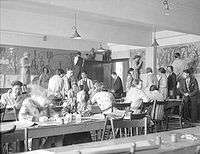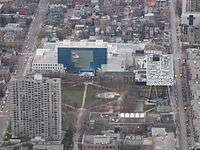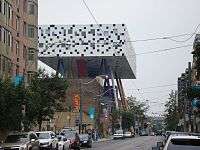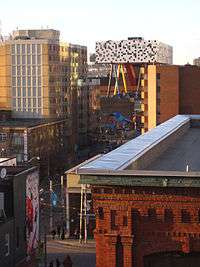OCAD University
|
Logo of OCAD University | |
Former names |
Ontario School of Art (1876–86) Toronto Art School (1886–90) Central Ontario School of Art and Industrial Design (1890–1912) Ontario College of Art (1912–96) Ontario College of Art & Design (1996–2010) |
|---|---|
| Motto | Imagination is Everything |
| Type | Public university |
| Established | 1876 |
| Endowment | C$9,576,604[1] |
| Chancellor | Catherine Delaney |
| President | Sara Diamond |
Academic staff | 200 |
Administrative staff | 485 |
| Students | 6,072 |
| Undergraduates | 4,882 |
| Postgraduates | 100 |
| Location |
Toronto, Ontario, Canada 43°39′11″N 79°23′28.3″W / 43.65306°N 79.391194°WCoordinates: 43°39′11″N 79°23′28.3″W / 43.65306°N 79.391194°W |
| Campus | Urban |
| Affiliations | AICAD, AUCC, CBIE, COU, IAU, |
| Website |
www |
OCAD University (/ˈoʊkæd/ OH-kad), formerly the Ontario College of Art and Design, is a public university located in Toronto, Ontario, Canada. The school is within the Grange Park neighbourhood, and adjacent to the Art Gallery of Ontario. The school is Canada's largest and oldest educational institution for art and design.[2] OCAD U offers courses through the Faculties of Art, Design, Liberal Arts and Sciences, and alternative programs. The enabling legislation is Ontario College of Art and Design University Act, 2002.[3]
History
The University's beginnings stretch back to the project of the Ontario Society of Artists whose objectives included the development of art education in Ontario.[4]:11[lower-alpha 1] The Ontario Society of Artists passed the motion to "draw up a scheme" for a school of art on 4 April 1876, and the first School of Art opened on 30 October 1876, funded by a government grant of $1,000.[5][6]
Curriculum

In 1971–72, Roy Ascott radically challenged the pedagogy and curriculum structure of the College.[7]:41–68
In 2008, OCAD president Sara Diamond changed the pedagogy. She emphasised academics over studio time and required full-time instructors to hold an advanced degree. There was some controversy as two faculty resigned over the changes.[8] in 2010, Tom Travis, then president of Dalhousie University in Halifax, was conducted a confidential review of how OCAD was managed. He found that the number of senior faculty and administrators was excessive. He recommended that deans be given more autonomy. Sara Diamond adopted most of his 30 recommendations, for example, giving department deans more power.[9]
Name changes
OCAD University has had a number of names over time.[10][11]
- Ontario School of Art, 1876–86 founded by the Ontario Society of Artists to provide professional training in art.[12]



- Toronto Art School, 1886–90
- Central Ontario School of Art and Industrial Design, 1890–1912
- Ontario College of Art (OCA), 1912–96
- Ontario College of Art and Design (OCAD), 1996–2010
- OCAD University, 2010–present
Academic degrees
OCAD offers a Bachelor of Arts (Visual and Critical Studies).[13]
The school combines a studio-based education with liberal studies, which is recognised with a Bachelor of Fine Arts (BFA), a Bachelor of Design (BDes), an Interdisciplinary Master's in Art Media and Design (MA, MFA or MDes), a Master of Fine Arts in Criticism and Curatorial Practice (MFA), a Master of Design in Strategic Foresight and Innovation (MDes), an Executive Master of Design in Advertising (EMDes), a Master of Design in Inclusive Design (MDes), and a Graduate Program in Digital Futures (Graduate Diploma and MA, MDes, MFA).
Campus
The OCAD campus consists of a north campus and a south campus.[14] The north campus includes the Main Building and Sharp Centre for Design, the adjacent Butterfield Park, the Annex Building, the Rosalie Sharp Pavilion, the Student Centre, the Inclusive Design Institute, and the Continuing Education Centre.[15] The south campus consists of buildings that are physically situated on Richmond Street West, plus the proposed Mirvish-Gehry development further south on King Street.[16][17]
Buildings at OCAD are referred to by their street addresses.[18] Some buildings are also assigned a building number that is encoded as the first digit in 4-digit room numbers.[15]
Notable Buildings
The Main Building
The Main Building traces its roots to the first building that the school constructed, which was also the first building in Canada specially built for art education. Now known as the George A. Reid Wing,[19] the building was designed by the school’s principal George A. Reid in the Georgian style[4]:21[20]:15 and opened on 30 September 1921.[4]:16[20]:15[21] On 17 January 1957, the first extension, a modernist[20]:17 building known today as the A. J. Casson Wing,[22] was completed and was opened. Two more extensions to the building were subsequently added in 1963 and 1967.[21]
Sharp Centre for Design
In 2000, funding was secured from Ontario’s SuperBuild program to build a fifth extension to the Main Building.[20]:17[21] Through Rod Robbie of Robbie/Young + Wright Architects, Will Alsop of Alsop Architects was made aware of the project and was eventually selected in 2002.[20]:17–18[23] A joint venture was formed between the two firms and the new building, now known as the Sharp Centre for Design, was completed in 2004.[23][24] The design, which came out of a process of participatory design,[20]:18–19[24] consists of a box four storeys off the ground supported by a series of multi-coloured pillars at different angles and is often described as a tabletop.[25] The $42.5-million expansion and redevelopment has received numerous awards, including the first Royal Institute of British Architects Worldwide Award,[26][27] the award of excellence in the "Building in Context" category at the Toronto Architecture and Urban Design Awards,[28][29][30] and was deemed the most outstanding technical project overall in the 2005 Canadian Consulting Engineering Awards.[31][32][33]
Libraries and museums
The main library on campus is the Dorothy H. Hoover Library, located in the Annex Building.[34] The Learning Zone, also located in the Annex Building, houses the OCAD Zine Library, Art & Design Annuals and the Visionnaire periodical collection.[35]
A number of galleries or exhibition spaces exist both on-campus and off-campus; a faculty gallery is also planned as part of the proposed Mirvish-Gehry development.[16] The existing major exhibition spaces are:
- Onsite [at] OCAD U. Created in 2007 as the OCAD Professional Gallery before taking on its current name in 2010, Onsite [at] OCAD U is features works by national and international professional artists and designers.[36]
- Student Gallery. The Student Gallery curates and features works submitted by current OCAD students and recent alumni.[37] The Student Gallery used to be located at 285 Dundas St. West and 76 McCaul Street. It was created in the early 1970s[38][39]
- Graduate Gallery. The Graduate Gallery is a gallery for graduate students and research faculty.[40][41]
- Xpace. The OCAD Student Union runs a gallery called the Xpace Cultural Centre, located off-campus. (Hence Xpace, which stands for "external space.") It aims to provide students and emerging artists a space to exhibit their work in a professional gallery setting, and to better respond to "contemporary issues in theory and aesthetics" in the community through the use of shorter time frames in its programming.[42][43]
- Open Gallery. The Open Gallery is an exhibition space inside the Inclusive Design Institute building at 49 McCaul Street.[44][45]
Research
OCAD conducts research under the umbrella of the Digital Media Research + Innovation Institute (DMRII) which focuses on creative applied research in digital expression, digital immersion, digital experience and digital media industries. It consist of 19 research labs, including:
- the Ambient Experience Lab, focusing on experience design[46]
- the Art Research Centre[47]
- the Inclusive Design Research Centre (IDRC), focusing on inclusive design with an emphasis on information and communications technology[48]
- the Social Body Lab, focusing on the interaction between the human body and the external world, which includes material research and wearable technology[49]
- the Game:Play Lab, which explores, critiques, and expands the nature of the gaming experience through play, theory, and practice[50]
In addition to research centres within the school itself, OCAD also belongs to a number of research networks, including:
- the Centre for Innovation in Information Visualization and Data-Driven Design (CIV-DDD), led by York University[51] and funded by the Ontario Ministry of Research and Innovation,[52] is a 5-year research initiative launched in March 2010 to address "innovation and training in information and scientific visualization in Ontario"[53][54] and consists of a team each from York University, OCAD University (directed by Sara Diamond) and the University of Toronto, 14 industry partners, and a number of international collaborators;[50] and
- the Inclusive Design Institute (IDI), directed by Jutta Treviranus[55] and funded by the Canada Foundation for Innovation and the Ontario Ministry of Research and Innovation,[56][57][58] is a regional research network for inclusive design founded in 2008[59] and officially launched on 24 May 2012,[60] with the aim to "address the challenge of designing our information and communication systems (ICT) so that they work for all potential users, including users with disabilities, varying language needs and diverse cultural preferences";[55] it consists of eight core postsecondary partners (OCAD University, University of Toronto, Ryerson University, York University, University of Ontario Institute of Technology, Sheridan College, George Brown College and Seneca College) and over 100 collaborating organizations.[55]
Commercialization of research is supported by two incubators:
- the Imagination Catalyst, directed by the AVP Research and Graduate Studies and coordinated by the Digital Futures Implementation office, which provides incubator support for students, alumni, and faculty[50] and was established in August 2011 through the merger of the Digital Futures Accelerator and the Design Incubator;[61] and
- the MEIC convergence centre, an industry mobile incubator directed by the MEIC, a not for profit association of mobile industry stakeholders and academia.[62]
Notable faculty members
Faculty and staff of OCAD University have included
- Roy Ascott
- Barbara Astman
- Aba Bayefsky
- Bill Buxton
- Nicole Collins
- Bonnie Devine
- Allan Fleming
- Richard Fung
- Ian Carr-Harris
- Burton Kramer
- Martha Ladly
- Arthur Lismer
- J. E. H. MacDonald
- Jock Macdonald
- Christiane Pflug
- George Agnew Reid
- Lisa Steele
- Maurice Vellekoop
- George A. Walker
- Norman White
- Colette Whiten
Notable alumni
- Peggy Adam – French comic book artist, illustrator
- Myfanwy Ashmore – conceptual artist[63]
- Barbara Astman RCA – artist, photographer
- Yank Azman – actor
- Rebecca Belmore – artist
- David Blackwood – Canadian artist
- Shary Boyle – Canadian artist who works with sculpture, painting, drawing and performance
- Jubal Brown – video artist[64]
- George Bures Miller – installation artist
- Jack Bush – abstract expressionist painter, member of the Painters Eleven
- Meryn Cadell – writer, performance artist
- Franklin Carmichael – painter, member of the Group of Seven
- Robin Cass – filmmaker, producer
- Aimee Chan – graphic designer, Miss Hong Kong 2006, actress
- Greta Dale - muralist
- Ken Danby - artist, painter
- George Dunning – artist, illustrator
- Wallace Edwards – illustrator
- Frank Faubert – politician, final Mayor of Scarborough
- Ed Furness – comic book artist
- Gregory Gallant – comic book artist, writer
- Max Gimblett – artist
- Emanuel Hahn – sculptor, coin designer
- Rachel Hayward – actress
- Wade Hemsworth – songwriter
- Peter Ho – singer, producer, actor, model
- Cleeve Horne – painter, sculptor
- James Archibald Houston – artist, children's author
- Barbara Howard, RCA – Canadian artist and wood engraver
- Eli Ilan – sculptor
- Michael Ironside – actor, director
- Clark Johnson – actor, director
- Tracey Johnston-Aldworth - entrepreneur, environmentalist
- Carlos del Junco – musician
- Garry Kennedy – conceptual artist
- Christopher Kier – encaustic painter
- Brian Kipping - artist, musician
- Maya Kulenovic – painter
- William Kurelek – artist, writer
- Monte Kwinter – politician
- Martha Ladly – designer, musician
- Robert Lougheed – Canadian artist
- Irene Loughlin – performance artist, writer
- Wayne Lum – sculptor, commercial artist
- Duncan Macpherson – cartoonist
- Michael Martchenko – illustrator, illustrated Robert Munsch stories
- Jean Mathieson – animator
- Sanaz Mazinani – multidisciplinary fine artist
- Doris McCarthy – landscape artist
- Ross McLaren – artist, filmmaker
- Claire Mowat – writer
- Will Munro – artist
- Walter Tandy Murch – painter
- Shelley Niro - painter, installation artist, filmmaker
- Mary Margaret O'Hara – musician, actress
- Lucille Oille – sculptor, illustrator
- Kim Ondaatje – painter, photographer, filmmaker
- Harley Parker – painter
- Lee Patterson – actor
- Kelly Richardson – video artist, photographer
- William Ronald – painter, founder of the Painters Eleven
- Floria Sigismondi – photographer, director
- Anne Simpson – poet, novelist
- Michael Snow – installation artist, filmmaker
- Rudolf Stussi – painter
- Rick Switzer – sculptor
- Paul Szep – cartoonist[65]
- Gary Taxali – artist, illustrator
- Rirkrit Tiravanija – installation artist
- Maurice Vellekoop – artist, illustrator
- Lea Vivot – sculptor[66]
- George A. Walker – book artist
- Simon Wilcox – musician
- Dick Wilson – actor
- Elizabeth Wyn Wood – sculptor
- Manly E. MacDonald - artist
- Noreen Young – producer, puppeteer[67]
See also
- Canadian Interuniversity Sport
- Canadian government scientific research organizations
- Canadian industrial research and development organizations
- Canadian university scientific research organizations
- Higher education in Ontario
- List of Ontario Universities
- Ontario Student Assistance Program
References
- ↑ "OCAD University Foundation" (PDF). Ontario College of Art & Design University. Ernst & Young. 31 May 2011. Retrieved 10 December 2011.
- ↑ "OCAD University". Association of Universities and Colleges of Canada. 2011. Retrieved 10 December 2011.
- ↑ "Ontario College of Art and Design University Act, 2002, S.O. 2002, c. 8, Sched. E 2". gov.on.ca. Retrieved 20 June 2015.
- 1 2 3 Art Gallery of Ontario; Ontario College of Art (1976). 100 years: Evolution of the Ontario College of Art (Exhibition catalogue).
- ↑ "Early Purchases and the Foundation of Art Education". Archives of Ontario. Retrieved 16 September 2013.
- ↑ "Ontario Society of Artists: 100 Years 1872–1972". Art Gallery of Ontario. Retrieved 16 September 2013.
- ↑ Wolfe, Morris (2001). OCA 1967–1972: Five Turbulent Years. Toronto: Grubstreet Books. ISBN 0-9689737-0-1.
- ↑ Post, National (2 February 2007). "Duelling visions: OCAD students are resisting new plans to make big changes". Canada.com. Retrieved 26 March 2012.
- ↑ "Behind the scenes at OCAD: With acclaimed status, comes strife". The Globe and Mail. Retrieved 20 June 2015.
- ↑ Roshuowy, Kristin (27 April 2010). "OCAD graduates from college to university". Toronto: Toronto Star. Retrieved 12 September 2010.
- ↑ "Institutional Name Change Background". OCAD University. 2 March 2011. Retrieved 13 May 2011.
- ↑ Pound, Richard W. (2005). 'Fitzhenry and Whiteside Book of Canadian Facts and Dates'. Fitzhenry and Whiteside.
- ↑ "PEQAB". Retrieved 2014-07-28.
- ↑ "Visible Campus" (PDF). Federal Economic Development Agency for Southern Ontario. June 2012. pp. 6, 7, 10. Retrieved 22 November 2012.
- 1 2 "OCAD University Campus Map" (PDF). OCAD University. September 2012. Retrieved 22 November 2012.
- 1 2 "OCAD U part of proposed Mirvish-Gehry development". 3 October 2012. Retrieved 22 November 2012.
- ↑ "King Street Development to include OCAD U Public Learning Centre for Visual Art, Curatorial Studies and Art History". OCAD University. 1 October 2012. Retrieved 22 November 2012.
- ↑ "OCAD University Style Guide" (PDF). OCAD University. December 2011. p. 18. Retrieved 22 November 2012.
- ↑ "OCADU Receives Funds from Toronto Heritage, Better Buildings Partnership" (Press Release). OCAD University. 15 October 2010. Retrieved 17 June 2014.
- 1 2 3 4 5 6 Hume, Christopher (2011). "135 Years". In Grice, Gordon. Shift: Conventions. Toronto: OCAD U Student Press. pp. 13–20. ISBN 978-0-9783278-5-9.
- 1 2 3 "Historical Summary". OCAD University. Retrieved 17 June 2014.
- ↑ "In Media Res: Ontario College of Art & Design 2008–2009 Annual Report". p. 12. Retrieved 17 June 2014.
- 1 2 Whitehead, Terri (24 June 2004). "Top Table". Architects' Journal. Retrieved 17 June 2014.
- 1 2 Goldberger, Paul. "The Colorist: The Sky Line". The New Yorker. Retrieved 26 March 2012.
- ↑ "OCAD's 'Tabletop' comes out on top – Daily Commercial News". Dailycommercialnews.com. Retrieved 12 September 2010.
- ↑ "Ontario College of Art & Design". RIBA. Royal Institute of British Architects. Retrieved 17 June 2014.
- ↑ Higgins, Charlotte (17 June 2004). "Award for 'high art on grotty street'". The Guardian. Retrieved 17 June 2014.
- ↑ "Sharp Centre for Design wins best in show at Architecture and Urban Design Awards" (Press release). City of Toronto. 17 May 2005. Retrieved 17 June 2014.
- ↑ "Architecture and Urban Design Awards 2005 – Award of Excellence - Building in Context". City of Toronto. Retrieved 17 June 2014.
- ↑ Joanna (25 May 2005). "The AUDA Shows Love". Torontoist. Retrieved 17 June 2014.
- ↑ "Schreyer winner announced". Canadian Consulting Engineer. Toronto: Business Information Group. 46 (7): 6. December 2005. ISSN 0008-3267.
The winner of the 2005 Schreyer Award, the top technical award in the Canadian Consulting Engineering Awards, is the Ontario College of Art and Design, Sharp Centre for Design — Structural Engineering.
- ↑ "And the Beaubien goes to... Wayne Bowes" (PDF). Communiqué. Association of Consulting Engineers of Canada: 1–2. December 2005. Retrieved 17 June 2014.
The Schreyer Award for the most outstanding overall technical project was presented to Carruthers & Wallace Ltd, a division of Trow Associates, and MCW Consultants Ltd., for the Ontario College of Art & Design, Sharp Centre for Design.
- ↑ Axworthy, Nicole (March–April 2006). "Awards". Engineering Dimensions. Toronto: Association of Professional Engineers of Ontario: 21. ISSN 0227-5147. Retrieved 17 June 2014.
- ↑ "OCAD Library – Location". Retrieved 17 June 2014.
- ↑ "OCAD Library – Learning Zone". Retrieved 17 June 2014.
- ↑ "About Onsite [at] OCADU, 230 Richmond Street West, Street Level". OCAD University. Retrieved 22 November 2012.
- ↑ "Student Gallery". Ocad.ca. Retrieved 13 September 2012.
- ↑ "Student Gallery". Ocad.ca. Retrieved 7 June 2011.
- ↑ "Gallery 76 Project". OCAD University. Retrieved 22 November 2012.
- ↑ "Graduate Gallery". OCAD University. Retrieved 22 November 2012.
- ↑ "Graduate Gallery Application" (PDF). OCAD University. Retrieved 22 November 2012.
- ↑ Fisher, Deanne. "Fees: what changed, what didn't, and why". OCAD University. Retrieved 10 September 2014.
The fee for Xpace Cultural Centre, which is owned and operated by the Student Union, went up to $47 for all students.
- ↑ "Xpace Cultural Center". OCAD Student Union. Archived from the original on 25 August 2013. Retrieved 22 November 2012.
- ↑ "Xtension exhibition reimagines the digital future" (PDF). Sketch. 25 (1): 9. Summer 2013. Retrieved 12 September 2013.
- ↑ "Scotiabank Nuit Blanche: Exhibition Area B Independent Projects" (PDF). City of Toronto. Retrieved 12 September 2013.
- ↑ "Ambient Experience Lab – About". OCAD University. Retrieved 20 November 2012.
- ↑ "Research". OCAD University. Retrieved 20 November 2012.
- ↑ "About the IDRC". Inclusive Design Research Centre. Retrieved 5 October 2012.
- 1 2 3 "Digital Media Research + Innovation Institute (DMRII)". OCAD University. Retrieved 5 November 2012.
- ↑ Kostoff, Larissa, ed. (June 2010). "Measures of our Success" (PDF). Sketch: The magazine of OCAD University. Toronto, Canada: OCAD University (Spring/Summer 2010): 3.
- ↑ "York co-leads $11.5-million project on visualization tools". York University. Retrieved 5 November 2012.
- ↑ "CIV-DDD – About". OCAD University. Retrieved 5 November 2012.
- ↑ "OCAD University Annual Report 2009/2010". OCAD University. p. 23. Retrieved 5 November 2012.
- 1 2 3 "Inclusive Design Institute – About – Overview". Inclusive Design Institute. Retrieved 5 November 2012.
- ↑ "OCAD University welcomes the Inclusive Design Research Centre and the Inclusive Design Institute". Council of Ontario Universities. Retrieved 5 November 2012.
- ↑ "List of Funded Projects". Canada Foundation for Innovation. Retrieved 5 November 2012.
- ↑ "Ontario Research Fund Infrastructure Program" (PDF). Ontario Ministry of Research and Innovation. p. 10. Retrieved 5 November 2012.
- ↑ Treviranus, Jutta. "New Directions". Inclusive Design Research Centre. Retrieved 4 November 2012.
- ↑ "OCAD University opens Inclusive Design Institute". Council of Ontario Universities. Retrieved 5 November 2012.
- ↑ "OCAD University launches Imagination Catalyst, led by entrepreneur Steve Billinger". OCAD University. Archived from the original on 20 April 2012. Retrieved 5 November 2012.
- ↑ "MEIC – About". OCAD University. Retrieved 22 November 2012.
- ↑ "Little Mathletics: Myfanwy Ashmore Interview". Archived from the original on 25 April 2006. Retrieved 12 September 2010.
- ↑ Vaughan, R. M. (14 September 2003). "Spotlight: Jubal Brown: Mr. Misunderstood". Canadian Art. Retrieved 15 June 2012.
- ↑ "Paul Szep". spartacus.schoolnet.co.uk. Retrieved 12 September 2010.
- ↑ "Lea Vivot Sculptor and Bronze Sculptures". leavivot.com. Retrieved 12 September 2010.
- ↑ "Noreen Young". thehumm.com. Retrieved 12 September 2010.
Notes
- ↑ "... such a school is among the objectives listed in the Society’s constitution of 1875 and,... among the objects proposed at the founding of that Society in 1872." (p. 11)
External links
- Official website
-
 Media related to Ontario College of Art and Design at Wikimedia Commons
Media related to Ontario College of Art and Design at Wikimedia Commons
